In this article:
As the largest organ in the whole body, the skin needs a reasonable amount of upkeep and care to function nicely. Two of the most commonly used skin care items are hyaluronic acid and retinol. But which is better for wrinkles?
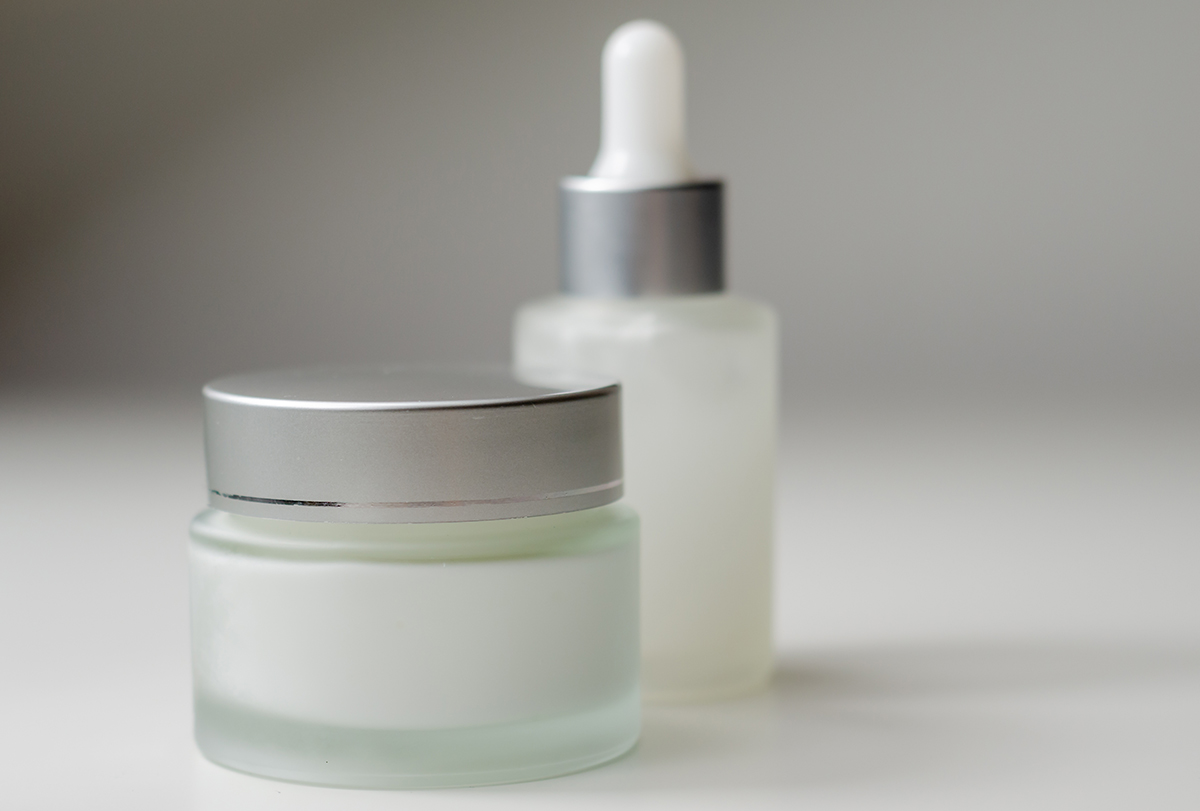
Dermatologists explain that hyaluronic acid is the one to go for if you have dry skin and require good moisturization. The key molecule responsible for skin moisturization is hyaluronic acid, which has an outstanding capacity of retaining water, which is helpful in dealing with wrinkles. (1)(2)
Retinol, on the other hand, works by stimulating collagen production, so it is great for aging skin. It is not recommended by skin care experts for sensitive skin as it can be a bit harsh for this skin type. (3)
Both hyaluronic acid and retinol have numerous skin care benefits and can even work together to deliver promising results, though you have to be cautious with the formulations you use. (2)
Hyaluronic acid and retinol are two of the most famous antiaging skin care ingredients, but how are they different? Which product is more suitable for you? Can you use them together at the same time?
Find out the answers to all these questions in detail.
Hyaluronic Acid Versus Retinol for Wrinkles
Wrinkles are lines that develop on your skin usually with age. They can sometimes feel like furrows and become easily noticeable.
Wrinkles are a natural part of aging. Genetics play a major role in determining skin texture and wrinkling, but other factors also contribute to wrinkles including: (1)
- Sun exposure
- Pollutants
- Smoking
- Hormonal changes
| Retinol | Hyaluronic acid |
|---|---|
| Retinol will help get rid of wrinkles more permanently. | Hyaluronic acid will diminish wrinkles temporarily. |
| Retinol is able to have effects deeper within the skin. | Hyaluronic acid works by repairing and hydrating the upper skin layers. |
| Retinol can cause itching and skin dryness and can make you susceptible to sun damage. | Hyaluronic acid is a mild skin ingredient with no adverse effects. |
| Retinol is recommended for all skin types other than dry skin. | Hyaluronic acid is highly recommended for dry skin. |
| Retinol is more potent than hyaluronic acid and has more widespread effects on the skin. | Hyaluronic acid is less potent than retinol. |
Retinol for wrinkles
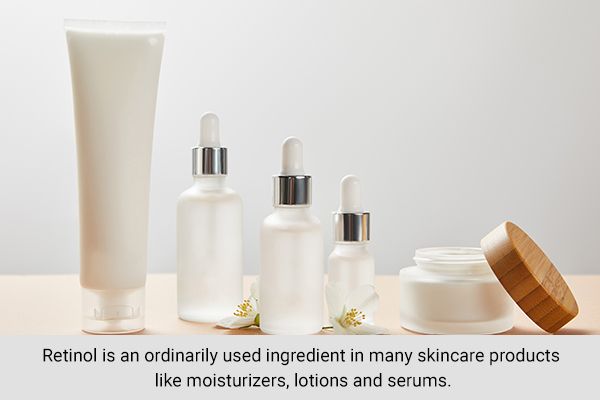
Retinol is a form of vitamin A, and it is very famous in the skin care world because of its many benefits. It is an ordinarily used ingredient in many skin care products such as moisturizers, lotions, and serums.
Retinol does a lot for your skin but is well-known for its antiaging effects. (3)
Several factors can cause wrinkles. As you age, your skin cells undergo divisions very slowly. Wrinkles occur when the middle layer of your skin becomes too thin and the skin has less elastin and collagen.
Mechanisms of action
Retinol is useful against wrinkles because it: (4)(5)
- Improves the development of collagen
- Aids the formation of fresh blood vessels in the skin
- Softens rough patches of skin
Duration of use
It takes around 3–6 months for retinoids to show any visible improvements in wrinkles. So, do not try them for only a few times but stick with them.
Points to remember
- Retinoids can cause skin dryness and irritation. Experts recommended using them on alternate days at first and then gradually working up to regular use.
- Retinoids increase the skin’s sensitivity to sunlight, so wear sunscreen when using them. (4)
Hyaluronic acid for wrinkles
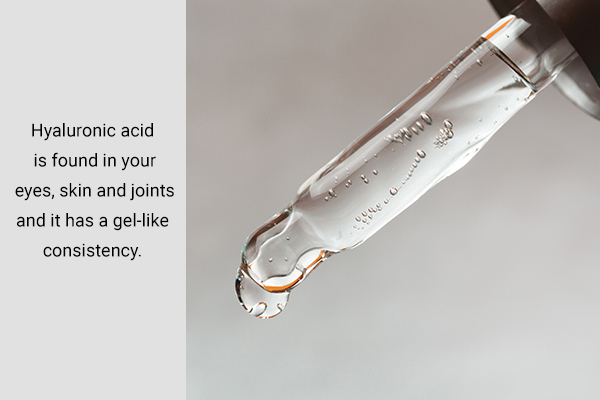
Hyaluronic acid, also called hyaluronan or hyaluronic, is inherently made by your body. It is found in your eyes, skin, and joints and has a gel-like consistency. It is known for its endless benefits and uses.
Antiwrinkle skin care products that contain hyaluronic acid are efficacious options for the treatment of wrinkles. According to studies, hyaluronic acid has been presented as an option equal to some medical procedures in this regard. (1)(6)
Mechanisms of action
Hyaluronic acid is useful against wrinkles because it: (7)
- Attracts water to swell and create volume, thus providing structural support
- Increases collagen production
Duration of use
According to a German study, using hyaluronic acid regularly, which is present in antiwrinkle creams, for over 3 months may result in positive effects on wrinkle depth and skin tightness. (6)
Point to remember
Prescription hyaluronic acid formulations should be used as recommended by your dermatologist.
Benefits of Hyaluronic Acid and Retinol
Here are the skin care benefits offered by hyaluronic acid and retinol when used topically on the skin.
Benefits of hyaluronic acid
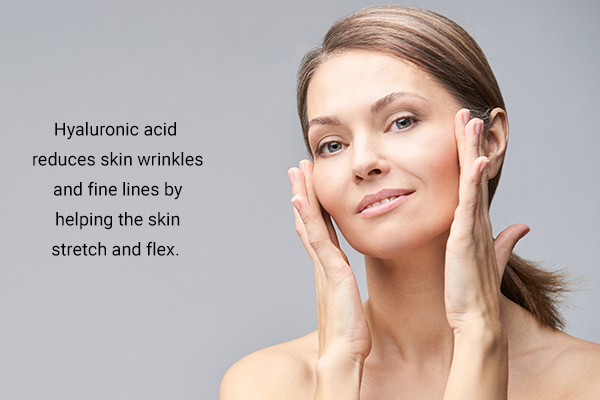
Here are some benefits of using hyaluronic acid.
1. Facilitates smooth movement
Hyaluronic acid is important in making your joints work smoothly as it prevents the bones from scraping against one another. It acts as a lubricant to make your bones move smoothly over each other and also acts as a shock absorber. (8)
2. Retains moisture
Youthful skin is known for its resilience and pliability. These characteristics are only possible due to its high content of water.
Hyaluronic acid is very good at keeping things hydrated because it retains water very well. It is used for treating dry eyes and is a common ingredient in creams, lotions, and serums because of its moisturizing properties. (1)
3. Makes skin flexible
Hyaluronic acid is important for enabling the skin to stretch and flex. For this reason, hyaluronic acid is used for reducing wrinkles and lines. (9)
4. Supports wound healing
Hyaluronic acid has also been proven to help in healing wounds and reducing scarring. It is involved in several mechanisms of the wound-healing process. (10)
Benefits of retinol
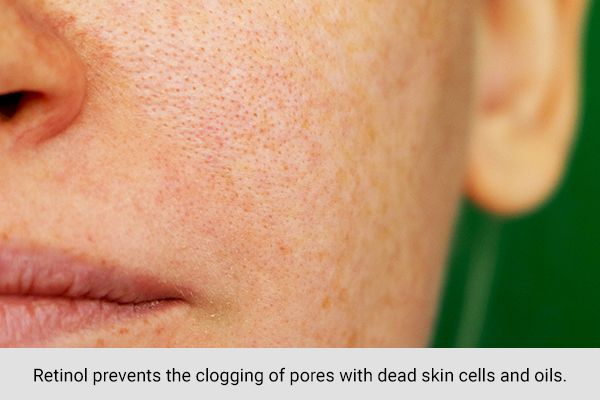
Here are some benefits of using retinol.
1. Prevents clogged pores
Retinol prevents the clogging of pores with dead skin cells and oils. Plugged-up pores are a significant issue as they may cause acne; therefore, retinol is useful against acne and acne scars.
Topical products with retinol decrease the swelling and inflammation associated with acne and help control potential breakouts. (11)
2. Treats dark spots
Dark spots, or hyperpigmentation, are a result of damage to the skin caused by sun exposure. They occur due to the buildup of melanin, which is the pigment responsible for your skin color.
Topical treatment of retinol lightens the skin spots and helps treat dark spots. (12)
3. Works against psoriasis
Psoriasis is a skin illness characterized by inflammation that results in the quick development of new cells of the skin. When these newly formed cells build up, rashes occur. Topical application of retinol slows this excessive development of cells and decreases the body’s inflammatory responses. (13)
Can I Use Both Hyaluronic Acid and Retinol Together?
Unlike many other skin care products, hyaluronic acid and retinol can be used up together in your skin care routine.
In fact, experts explain how using them together can reduce the harshness of using retinol by itself. Retinol is great for the skin but can have some adverse effects such as: (3)
- Photosensitization
- Irritation
- Erythema
- Dermatitis
- Pruritus
- Burning sensation
This is particularly true for those who have inherently sensitive skin. While most of the time skin care experts say these side effects settle on their own as your skin begins to adapt to the treatment, it can be initially tricky to deal with.
Nonetheless, understanding how to incorporate both hyaluronic acid and retinol into your skin care to reap their benefits is the key!
How Should Hyaluronic Acid and Retinol Be Used Simultaneously?
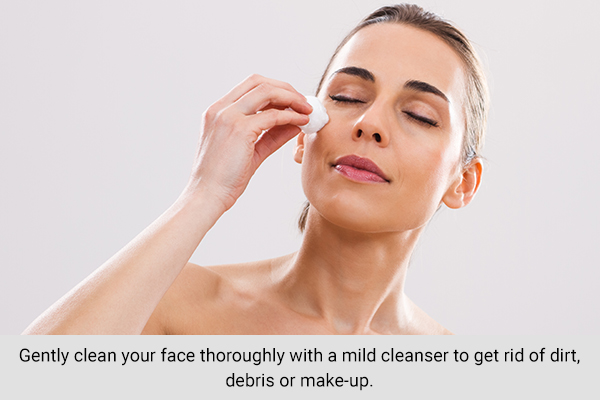
Here is a dermatologist-recommended skin care routine that combines both hyaluronic acid and retinol:
- Gently clean your face thoroughly with a mild cleanser to get rid of dirt, debris, or makeup.
- Pat your skin dry instead of rubbing your skin with a towel.
- Once your face is completely dry, apply retinol (serum) using your fingertips. Gently pat or dab it onto your skin.
- Apply hyaluronic acid in a similar way.
- Apply a good moisturizer.
Note: If your retinol is in a moisturizer form, it will be the last step of your skin care routine and not the first.
Most-Asked Questions
How can I prevent wrinkles?
Protect your skin from the appearance of wrinkles by doing the following:
- Limit your time in the sun.
- Use sunscreen before going outdoors.
- Moisturize properly regularly.
- Quit smoking.
- Eat a healthy diet and avoid junk food.
Is hyaluronic acid safe?
Studies have shown that hyaluronic acid can be used safely. Side effects from hyaluronic acid are not very common, and it’s even safe to be used by new mothers or pregnant women.
How do you use retinol?
To apply your retinol product, do as instructed on the product container.
Here are some tips:
- Cleanse your skin before applying retinol to it.
- For the first few days, apply retinol on alternate days and not daily.
- Apply a facial moisturizer as the last step of your skin care.
Can retinol damage my skin?
If you use retinol, you are more prone to sunburn, which can lead to skin damage, so be sure to wear sunscreen when using retinol products.
Final Word
Wrinkles can make you feel less confident about your appearance, especially during your young years.
Although various medical treatments are available to smooth them out such as skin-resurfacing techniques, fillers, and surgery, topical treatments such as retinol and hyaluronic acid are also effective.
- Was this article helpful?
- YES, THANKS!NOT REALLY


